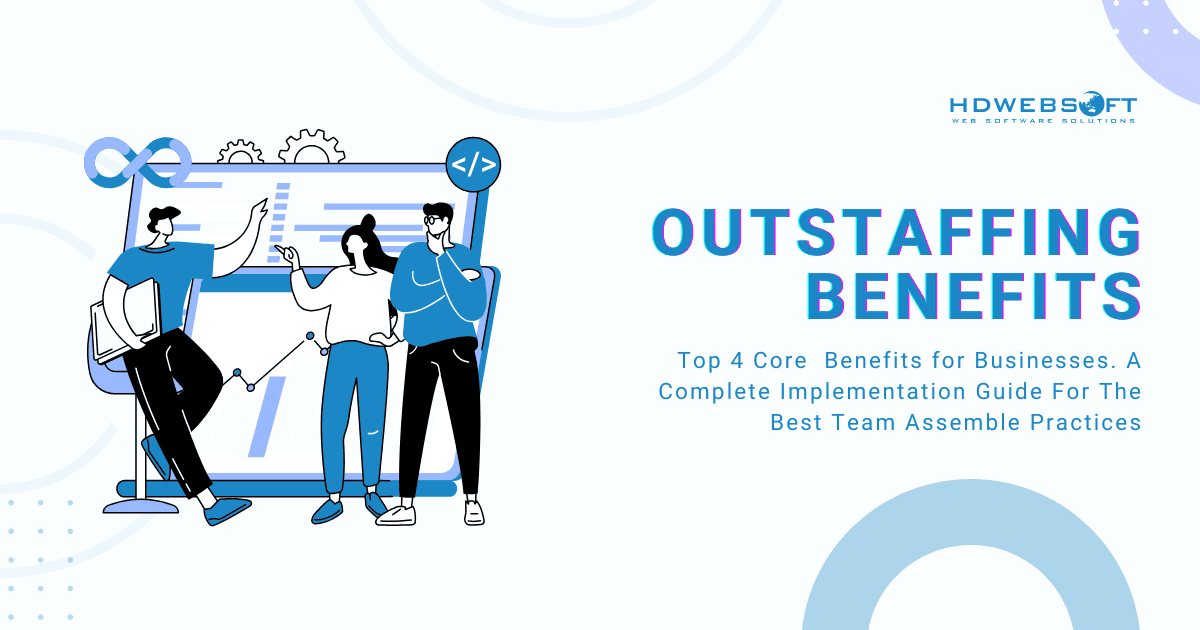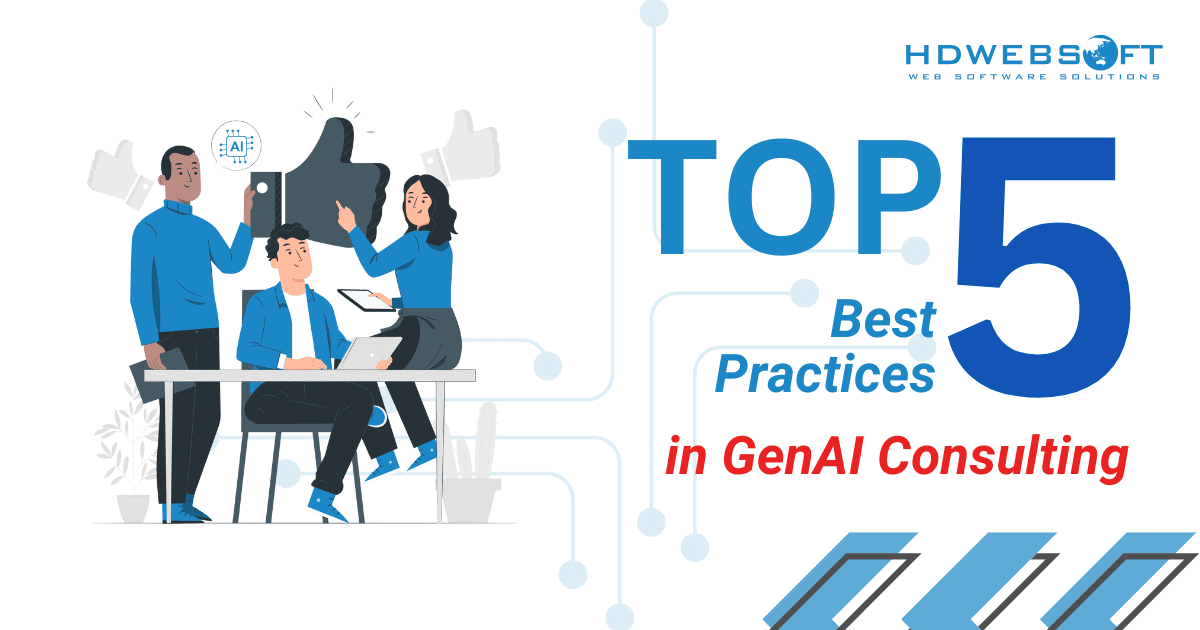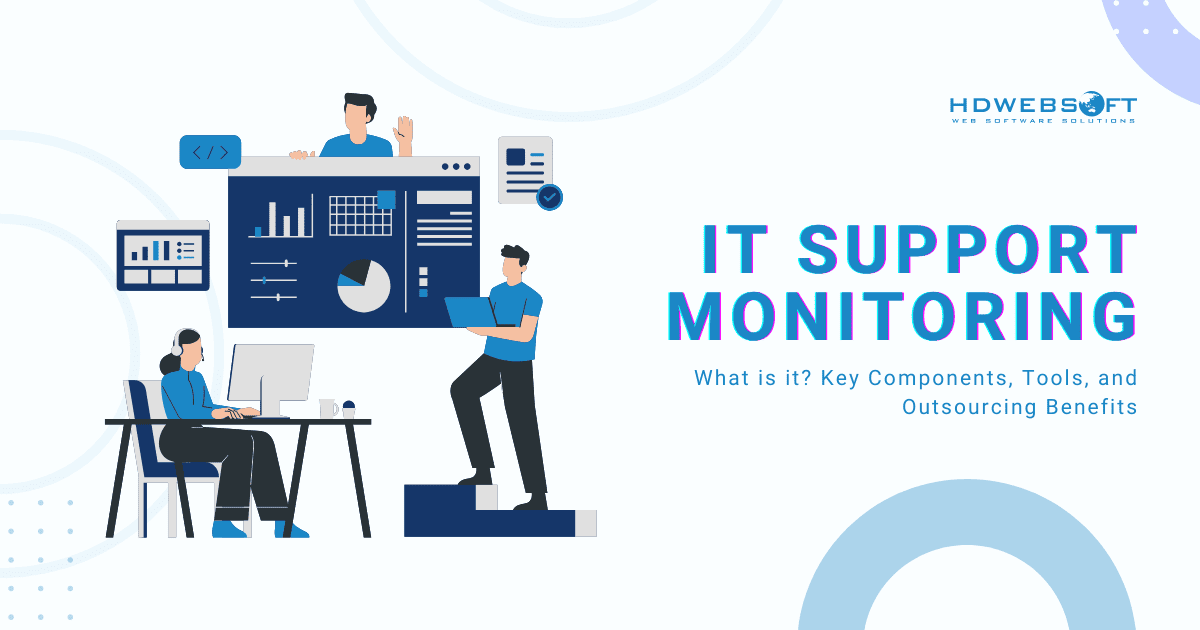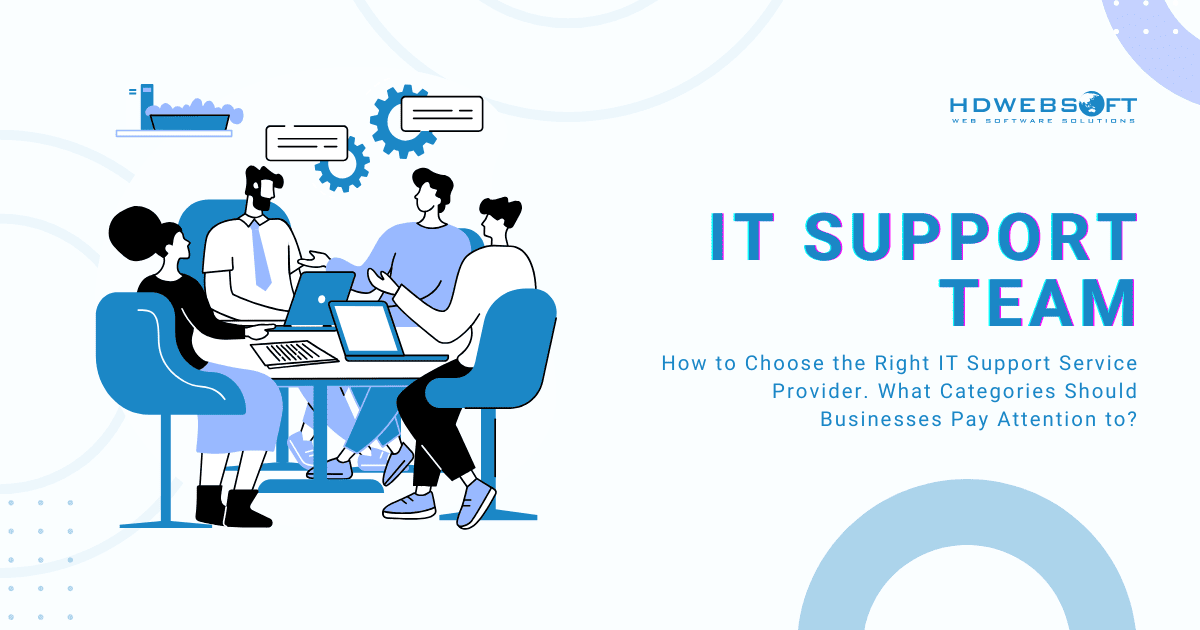
How To Choose The Right IT Support Team
Finding the right IT support team can make or break your business’s technological foundation and operational efficiency. While many companies consider IT support outsourcing a strategic move, the process of selecting an IT support service provider requires careful evaluation of multiple factors. Whether you’re scaling your business or replacing an underperforming provider, partnering with the right professionals ensures seamless operations.
Hence, in today’s blog, we’ll walk you through the essential steps for selecting an IT support service provider that aligns with your business needs. You’ll discover practical frameworks for assessment, industry-specific considerations, and actionable checklists that streamline your selection process. Meanwhile, you’ll be able to avoid common pitfalls that could cost your business time and money.
- 1) Understanding Your Business IT Support Needs
- 2) Essential Qualifications of an Effective IT Support Team
- 3) Types of IT Support Team Models
- 4) Evaluating Technical Expertise and Capabilities
- 5) Service Delivery Framework Assessment
- 6) Security and Compliance Evaluation
- 7) Financial Considerations and Contract Structure
- 8) Vendor Research and Due Diligence Process
- 9) The Selection and Interview Process
- 10) Implementation and Transition Planning
- 11) Ongoing Relationship Management
- 12) Conclusion
Understanding Your Business IT Support Needs
Before evaluating potential providers, businesses must conduct a comprehensive assessment of their current technology landscape. Start by documenting your existing IT infrastructure, including servers, networks, software applications, and security systems. Additionally, identify recurring technical issues, system vulnerabilities, and areas where your current support falls short.
Conducting a Comprehensive IT Infrastructure Audit
Practical IT support team assessment begins with mapping your entire technology ecosystem from hardware components to software applications. You need to document every server, workstation, network device, and mobile device that connects to your business systems.
Furthermore, catalog all software licenses, cloud subscriptions, and third-party integrations that your IT support service provider will need to manage. This comprehensive inventory helps potential providers understand the scope and complexity of your environment.
Beyond basic documentation, evaluate the age and condition of your current technology assets. Older systems may require specialized knowledge or frequent maintenance that not all IT support service providers can deliver effectively. Moreover, identify systems approaching end-of-life status that may need replacement or upgrade planning within your support contract timeline.
Identifying Industry-Specific Requirements and Compliance Obligations
Different industries impose unique requirements that your IT support vendor must understand and navigate successfully.
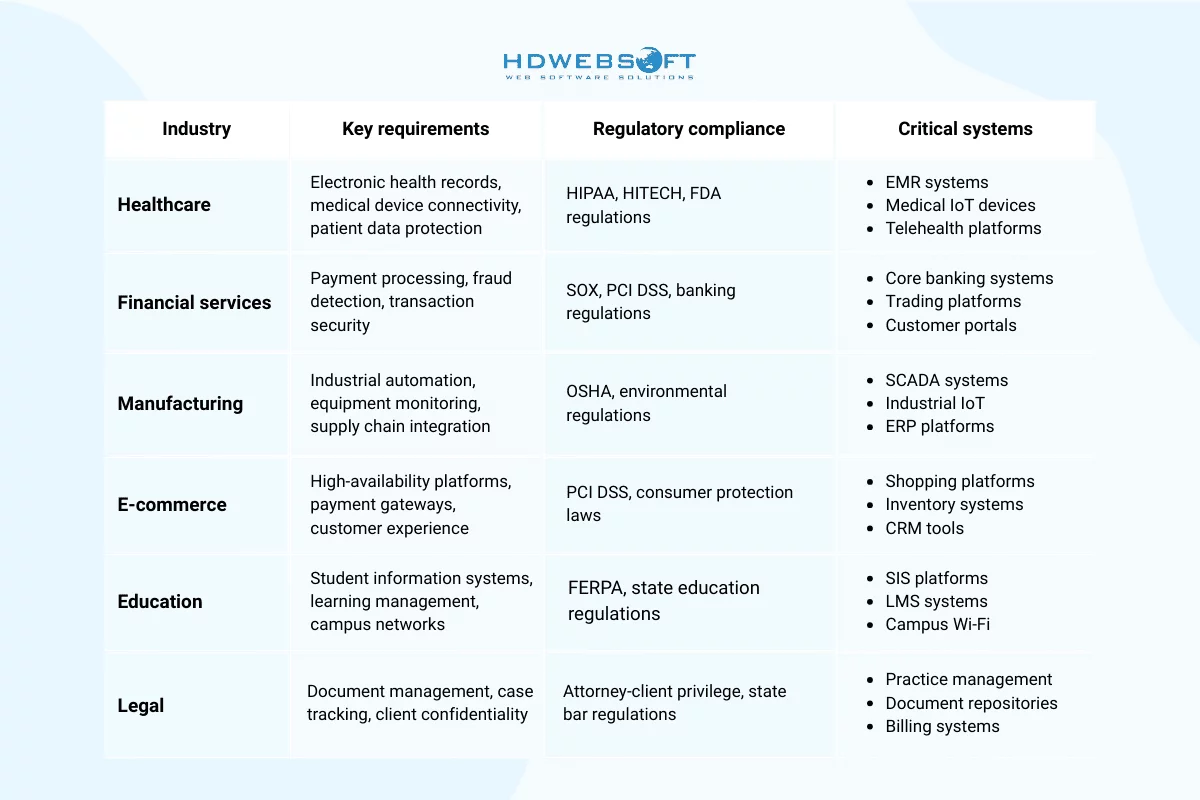
Determining Service Scope and Support Level Requirements
Business operations dictate whether you need reactive break-fix support or proactive managed services from your IT support team. Companies with mission-critical systems typically require 24/7 monitoring and rapid response capabilities to ensure uninterrupted operations. Meanwhile, smaller organizations might function adequately with business-hours support and longer response times. Additionally, consider whether you need strategic technology consulting or simply technical troubleshooting assistance.
Growth planning also influences service scope requirements. Rapidly expanding businesses need IT support service providers who can scale services quickly and recommend technology solutions that accommodate increased user loads. Similarly, consider seasonal variations in your business that might require flexible support arrangements during peak periods.
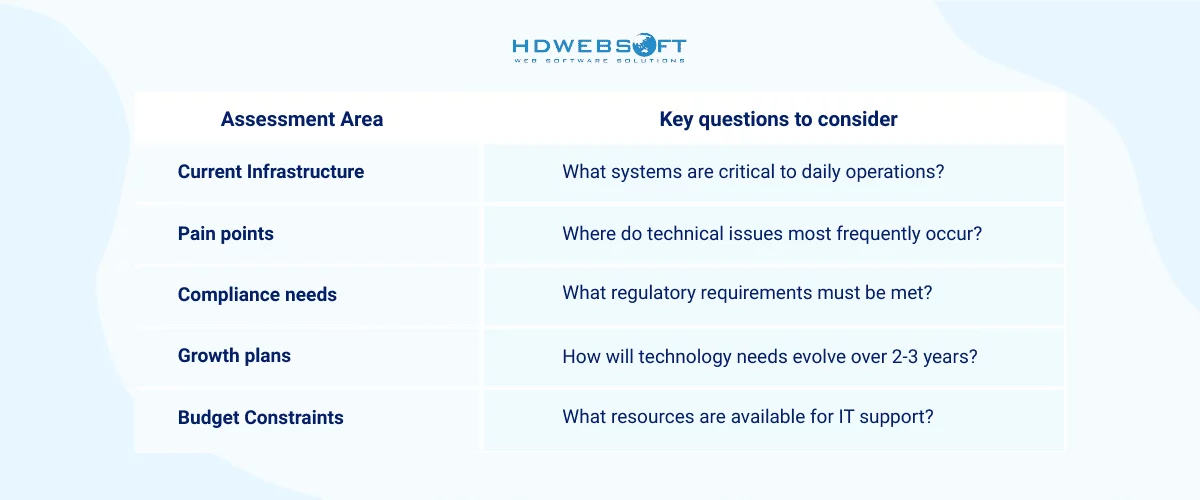
Essential Qualifications of an Effective IT Support Team
Technical expertise forms the cornerstone of any reliable IT support service provider. Look for professionals with industry-recognized certifications as a form of confirmation of their expertise. However, certifications alone don’t guarantee competence; therefore, evaluate their hands-on experience with technologies similar to your environment.
Technical Certifications and Professional Credentials
Industry certifications provide standardized benchmarks for evaluating IT support team qualifications across different specialization areas.
However, certification currency matters significantly in rapidly evolving technology environments. The IT landscape is constantly evolving with emerging threats, new technologies, and shifting best practices. Hence, your IT support service provider should maintain current certifications and pursue continuing education to stay ahead.
Furthermore, team members should hold certifications relevant to their specific technology stack. This is because generic credentials may not be applicable to their environment.
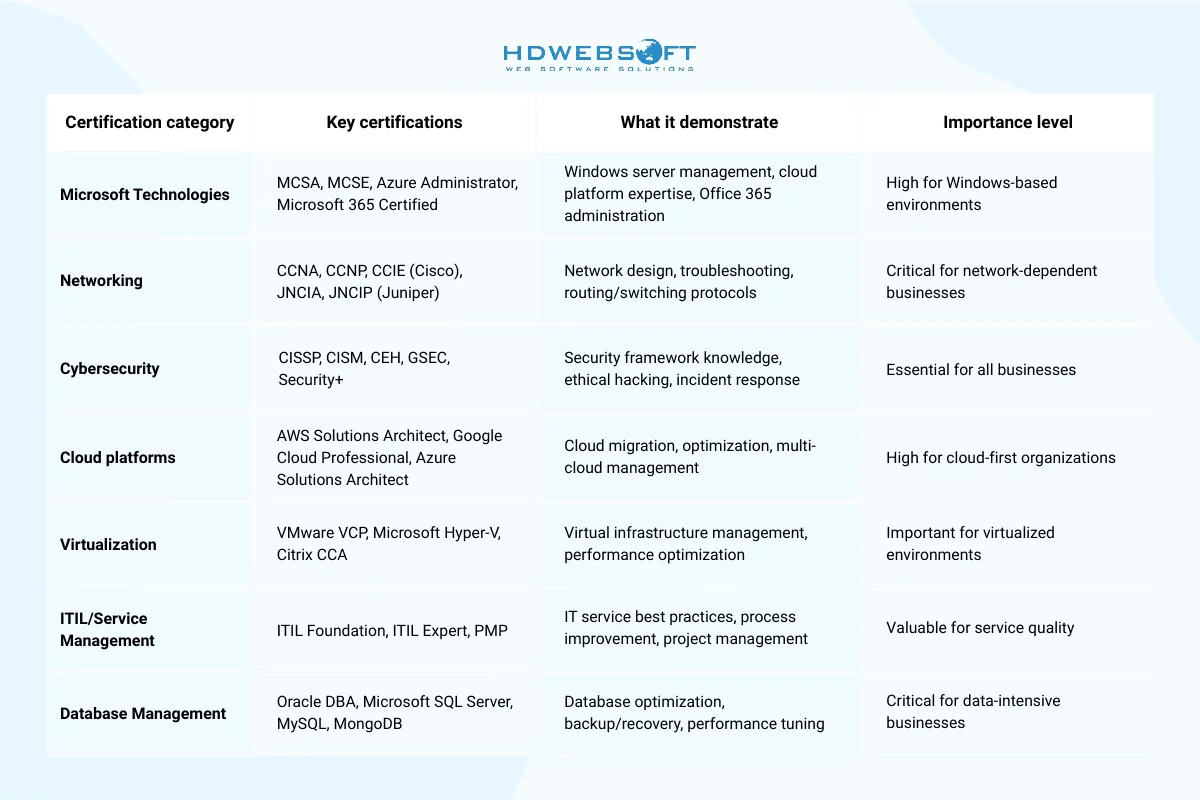
Communication Skills
Beyond technical abilities, effective communication skills are equally crucial for the performance of an IT vendor. Your IT support service provider should explain complex issues in business terms. They should also provide clear timelines for resolution and maintain professional interactions with all staff levels.
Consequently, teams that excel in both technical and soft skills create more productive partnerships and reduce friction during critical incidents.
Customer Service Orientation
It’s also important to distinguish exceptional providers from those who simply fix technical problems. A quality IT support team understands the business impact of system failures and prioritizes issues accordingly. Moreover, they proactively communicate status updates during extended troubleshooting sessions and follow up to ensure user satisfaction with implemented solutions.
Problem-Solving Methodology
Structured troubleshooting approaches separate a professional IT support service provider from ad-hoc repair services. Top-tier providers follow documented methodologies that ensure consistent problem resolution and knowledge capture for future reference. Additionally, they implement preventive measures based on root cause analysis rather than simply addressing symptoms of underlying issues.
Documentation Practices
Last but not least, documentation practices reveal organizational maturity and long-term service sustainability. Your IT support service provider should maintain detailed records of your environment configuration, change history, and incident resolution procedures. Furthermore, they should provide regular reports on system health, performance trends, and recommended improvements based on observed patterns.
Types of IT Support Team Models
Organizations can choose from several IT support team structures, each offering distinct advantages depending on business needs and budget constraints.
In-House vs. Outsourced vs. Hybrid Approaches
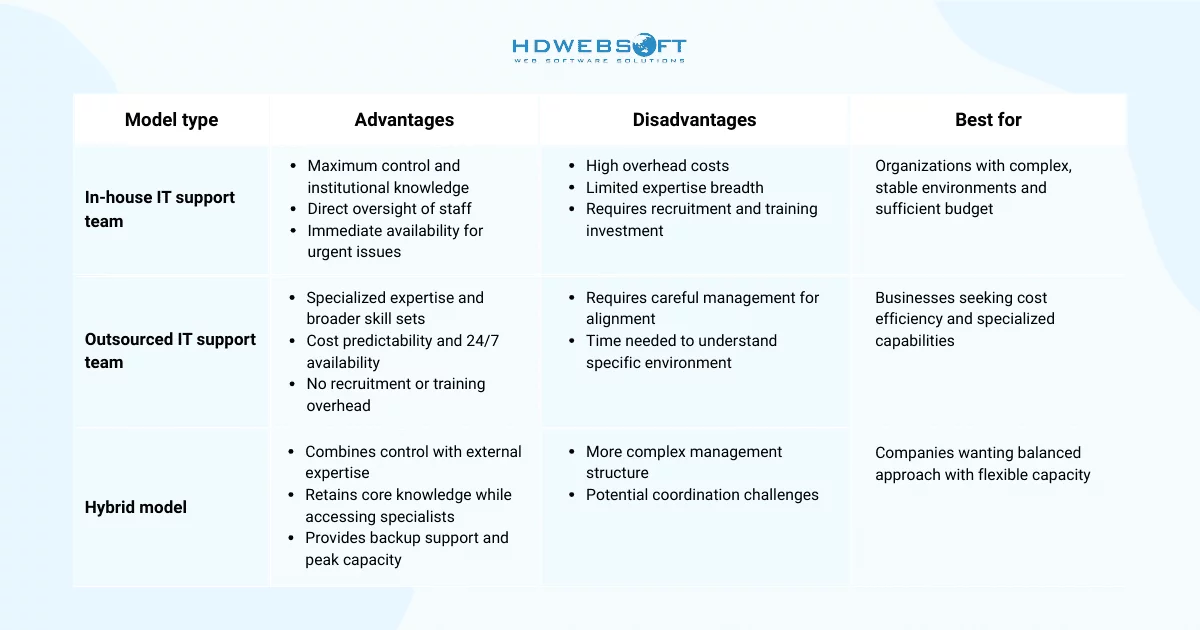
Geographic Considerations and Service Delivery Models
For the record, location significantly impacts the effectiveness of an IT vendor. In particular, businesses that require on-site assistance or those operating across multiple time zones.
A local IT support service provider can respond quickly to hardware failures and provide face-to-face consultation. However, they may have limited availability outside of regular business hours. Conversely, remote teams offer 24/7 support capabilities but might face challenges with hands-on troubleshooting requirements.
Global service delivery models combine local presence with follow-the-sun support as they provide continuous coverage. All the while, reasonable response times for physical interventions are maintained. These arrangements work well for multi-location businesses that need consistent service standards across different regions. Moreover, they provide cost optimization opportunities by leveraging different labor markets while maintaining service quality standards.
Staffing Models and Resource Allocation Strategies
Most importantly, a dedicated IT support team provides consistent service from familiar technicians who develop a deep understanding of your environment over time. This model works well for complex environments requiring specialized knowledge or businesses with unique configuration requirements. Additionally, dedicated teams can integrate more closely with internal processes and provide strategic technology guidance beyond basic troubleshooting.
What’s more, shared resource models distribute IT support service provider staff across multiple clients to optimize utilization and reduce costs. While this approach offers cost advantages, it may result in less consistent service delivery and longer response times during peak demand periods. Furthermore, shared teams may lack deep familiarity with your specific systems and business requirements.
Evaluating Technical Expertise and Capabilities
A comprehensive technical assessment ensures your chosen IT vendor can handle both current needs and future challenges. Begin by evaluating their experience with your specific technology stack, including operating systems, databases, cloud platforms, and business applications. Additionally, assess your IT support team’s expertise in emerging technologies relevant to your industry.
Core Technology Competencies
Infrastructure management capabilities form the foundation of an effective IT support service provider’s performance. Evaluate their experience with your current server platforms, storage systems, networking equipment, and virtualization technologies. Additionally, assess their knowledge of backup and disaster recovery solutions, as these capabilities become critical during system failures or security incidents.
Specialization Areas
Application support expertise varies significantly among IT support vendors, making it essential to verify relevant experience with your business-critical software. Many providers excel at common productivity applications but lack knowledge of specialized industry software or custom-developed systems. Furthermore, evaluate their ability to support software integrations and API connections that enable business process automation.
Cloud Platform Expertise and Migration Experience
Cloud computing proficiency has become increasingly important as businesses migrate to platforms like AWS, Microsoft Azure, and Google Cloud. Your IT support team should demonstrate experience in cloud migration planning, cost optimization, and ongoing management of hybrid environments. Moreover, they should understand multi-cloud strategies and vendor management approaches that many enterprises adopt.
It’s worth noting that migration expertise extends beyond simple lift-and-shift operations to include application modernization and architecture optimization. Quality IT support vendors can recommend cloud-native solutions that improve performance while reducing operational costs. Moreover, they should provide guidance on cloud governance, security implementation, and compliance management in distributed environments.
Security Expertise and Threat Response Capabilities
Cybersecurity knowledge deserves special attention, given the escalating threat landscape that affects businesses of all sizes. Evaluate your potential IT vendors’ understanding of current security frameworks, incident response procedures, and compliance requirements relevant to your industry. Plus, assess their experience with security tools such as firewalls, intrusion detection systems, vulnerability scanners, and endpoint protection platforms.
Moreover, threat response capabilities distinguish reactive support from proactive security management. Your IT support team should maintain current knowledge of emerging threats, attack vectors, and defense strategies.
In addition, they should provide security awareness training for your staff. They should also implement monitoring systems that detect suspicious activities before they escalate into major incidents.
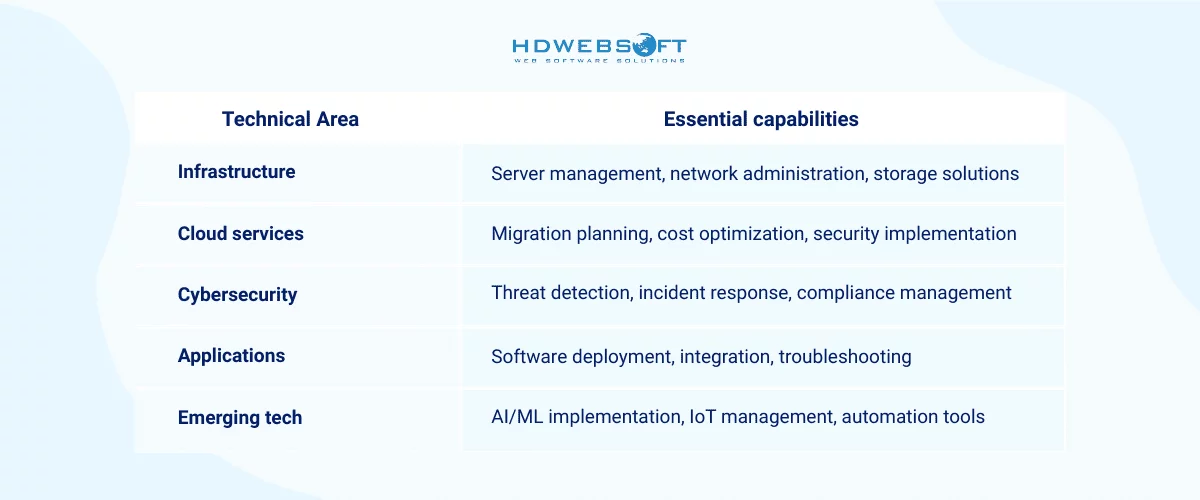
Service Delivery Framework Assessment
Effective IT support vendors operate within well-defined service frameworks that ensure consistent, high-quality assistance. First, examine their support availability options, ranging from standard business hours to 24/7 coverage. And then you can determine which model aligns with your operational requirements. Furthermore, understand their response time commitments for different priority levels and how they categorize incidents.
Support Availability and Response Time Commitments
Business continuity requirements dictate the level of availability your IT support vendor must provide. Companies with global operations or mission-critical systems typically require 24/7/365 coverage with rapid response capabilities. However, smaller organizations might function adequately with extended business hours support and longer response timeframes for non-critical issues.
Response time commitments should align with your business impact tolerance for different types of incidents. Thus, your IT support team should offer clear SLAs that define response times for various priority levels. Moreover, these agreements should include escalation procedures and penalty clauses for failing to meet response targets.
Communication Protocols and Reporting Standards
Regular communication maintains transparency and builds confidence in your IT support vendor’s performance. Evaluate how providers report on incidents, scheduled maintenance, system performance, and improvement recommendations. Furthermore, assess their knowledge management practices and whether they maintain detailed documentation of your environment and historical issues.
Also, incident communication protocols should provide stakeholders with timely updates without overwhelming them with technical details. Quality IT support service providers tailor their communication style to different audiences. It’ll help provide executive summaries for management while offering technical details to IT staff.
In essence, they should maintain permanent records of all interactions for future reference and trend analysis.
Escalation Procedures and Quality Assurance
Complex issues often require specialized expertise beyond first-level support capabilities. Examine how your potential IT support team handles escalations to senior technicians or vendor support organizations. Over and beyond that, evaluate their quality assurance processes and how they ensure consistent service delivery across different team members.
Escalation timeframes should be clearly defined to prevent issues from languishing without appropriate attention as well. Your IT support service vendor should maintain relationships with hardware and software vendors to expedite the resolution of product-specific problems. Moreover, they should provide regular training to ensure all team members maintain current knowledge and troubleshooting capabilities.
Security and Compliance Evaluation
Notably, security considerations extend beyond technical capabilities to include personnel screening, operational practices, and regulatory compliance expertise.
Personnel Security and Access Management
Background verification processes reveal the security consciousness of potential IT support service providers and their commitment to protecting client data. Quality providers conduct comprehensive background checks, including criminal history, employment verification, and reference checking for all technical staff. On top of that, they should maintain documentation of security training and awareness programs for their employees.
Access management protocols ensure that IT support team members can perform their duties while minimizing security risks to your environment. Providers should implement role-based access controls that limit system privileges to necessary functions only. Furthermore, they should maintain audit trails of all administrative activities and provide regular reports of access usage patterns.
Data Protection and Privacy Safeguards
The data handling procedures will demonstrate how your IT support service vendor protects sensitive information throughout the support relationship. These procedures should include encryption requirements for data in transit and at rest, secure communication channels for remote support sessions, and disposal protocols for any temporary data copies created during troubleshooting.
Over and above all this, privacy protection extends beyond technical controls to include contractual obligations and staff training programs. Your IT support vendor should sign comprehensive non-disclosure agreements and complete regular privacy training relevant to your industry requirements. Moreover, they should provide incident response procedures specifically designed to address potential data breaches or unauthorized access events.
Regulatory Compliance and Industry Standards
Compliance expertise varies significantly among IT support service providers. It becomes essential to verify relevant experience with your industry’s regulatory requirements.
Industry standard adherence demonstrates professional maturity and commitment to best practices. Look for an IT support team that maintains certifications in relevant frameworks such as ISO 27001, SOC 2, or NIST.
Financial Considerations and Contract Structure
Pricing models for IT support services vary considerably, from hourly rates and fixed monthly fees to comprehensive managed service agreements. Evaluate each model’s suitability for your usage patterns and budget predictability requirements. Importantly, understand what services are included in base pricing versus additional charges that might accumulate over time.
Pricing Models and Cost Structure Analysis
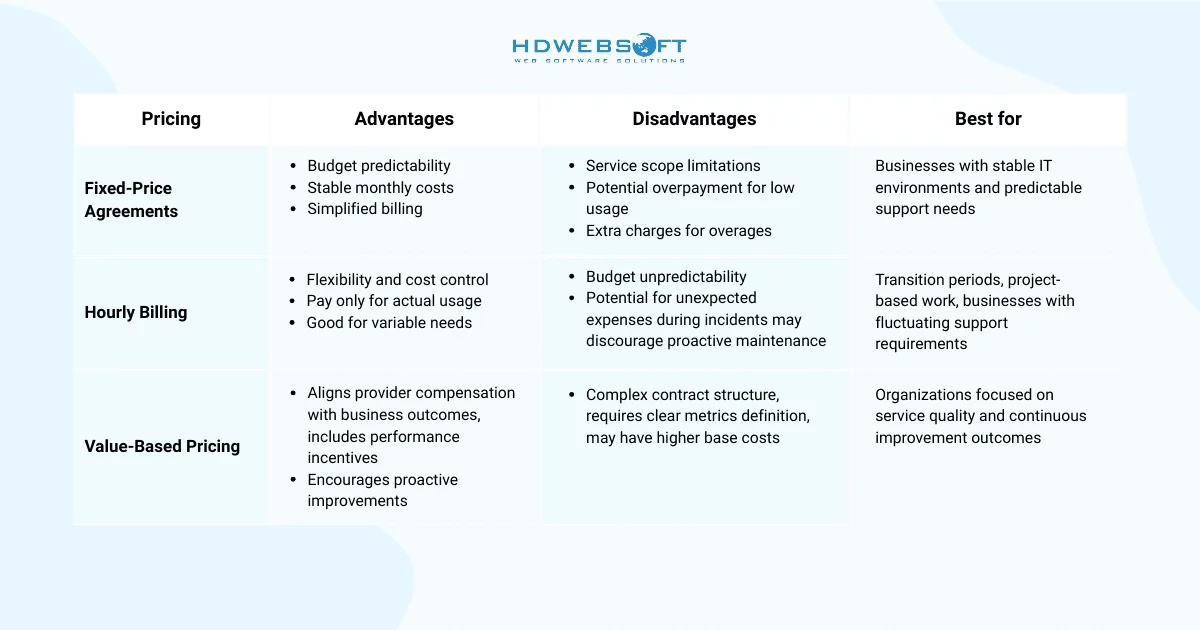
The true expense of IT support vendor relationships goes beyond base service fees. Common additional charges include:
- After-hours emergency support
- Specialized software licensing
- Hardware procurement markups
- Travel expenses for on-site visits
- Project work outside the normal support scope
Training and knowledge transfer costs often emerge during provider transitions or when implementing new technologies. Your IT support team should clearly define what training is included in base pricing versus additional charges for specialized education or certification programs.
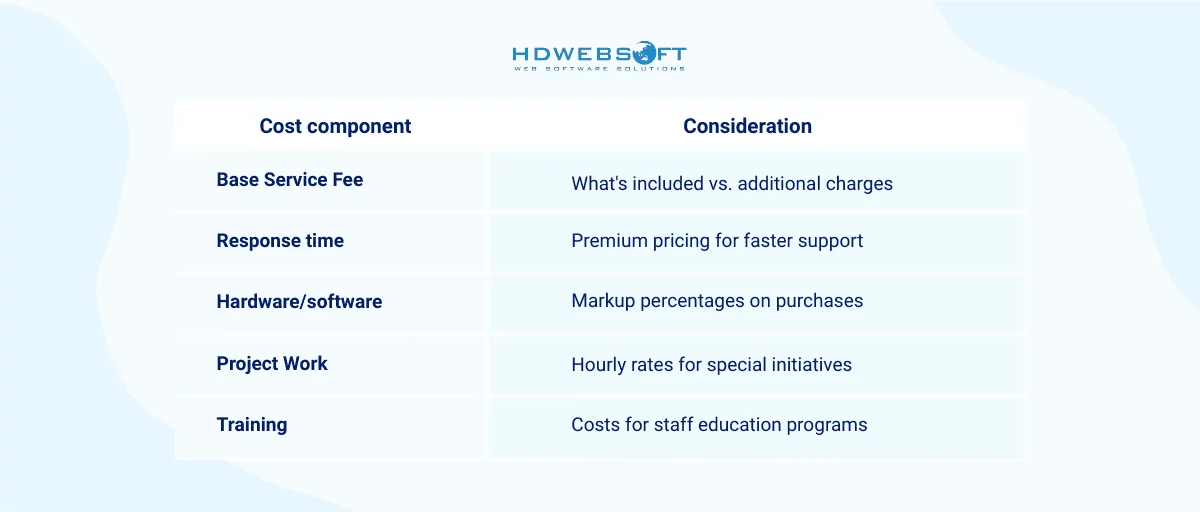
Vendor Research and Due Diligence Process
Thorough research distinguishes reliable IT support vendors from those that over-promise and under-deliver. Start by reviewing their client portfolio, focusing on organizations similar to yours in size, industry, and technology complexity. Moreover, request detailed case studies that demonstrate their problem-solving capabilities and measurable results achieved for previous clients.
When evaluating potential IT support service providers, use this comprehensive checklist to ensure a thorough assessment:
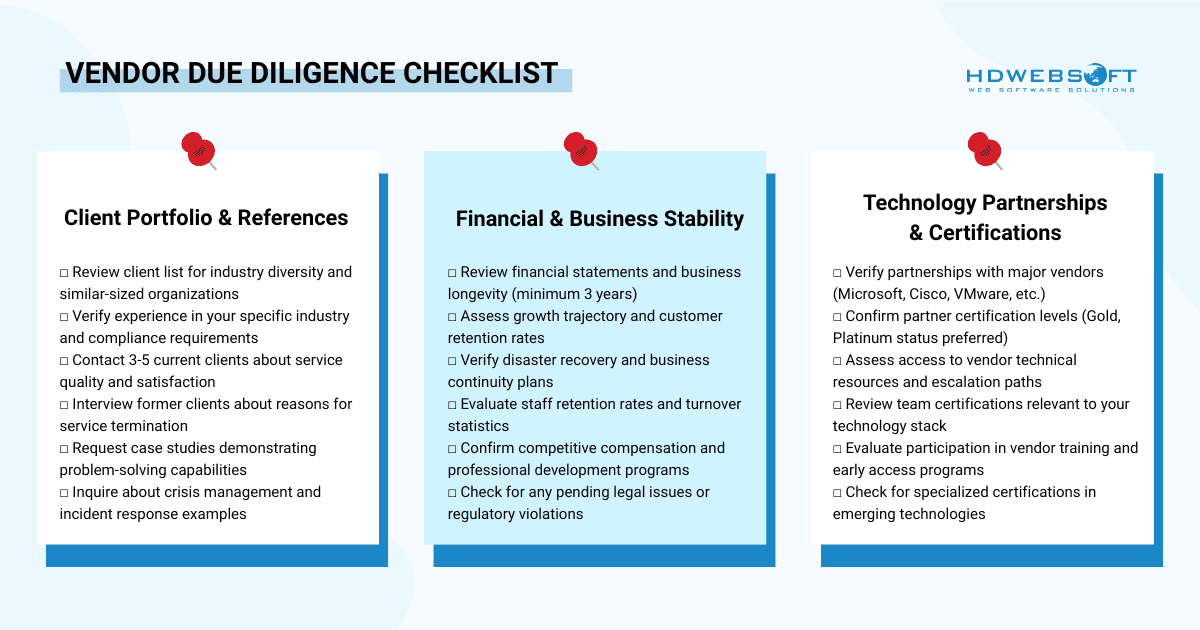
The Selection and Interview Process
Structured evaluation processes help identify the most suitable IT support vendor for your specific requirements. Develop scoring criteria that weight technical capabilities, service delivery, cultural fit, and cost factors according to your priorities. Plus, create standardized questions that allow fair comparison across multiple IT support service providers during the evaluation process.
Here’s a structured approach for you to assess and compare IT support team candidates objectively:
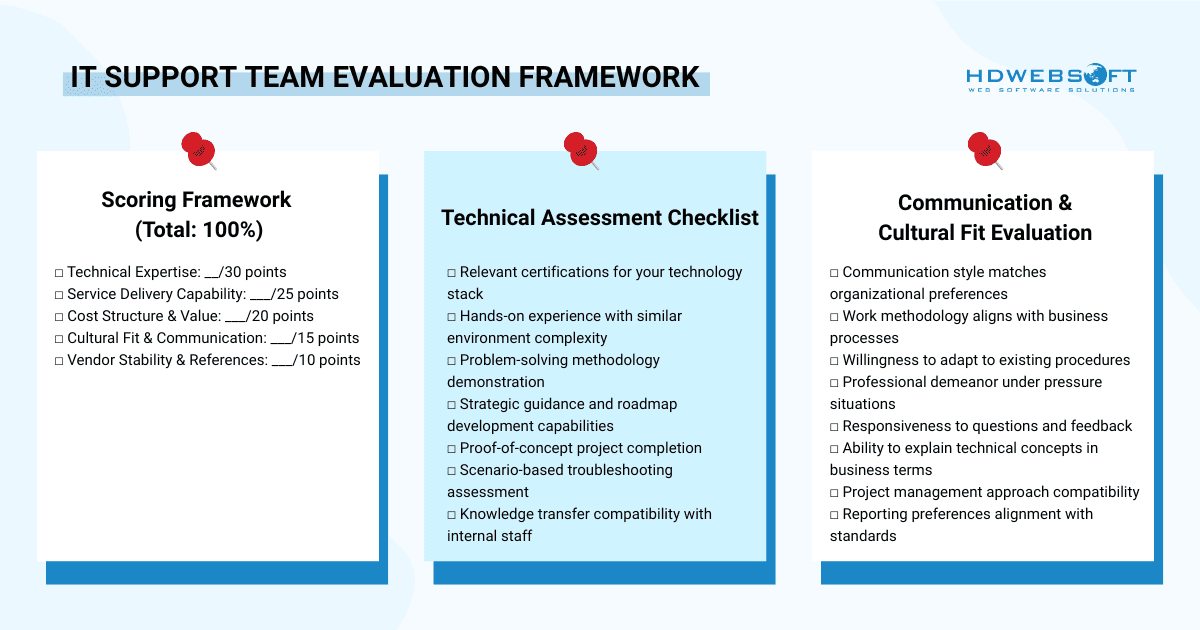
Implementation and Transition Planning
Successful IT support vendor transitions require careful planning and execution to minimize business disruption while ensuring comprehensive knowledge transfer. Clearly defining success metrics and checkpoint reviews will assist you with monitoring transition progress and addressing issues promptly.
In order to ensure smooth implementation and minimize business disruption, use this checklist:
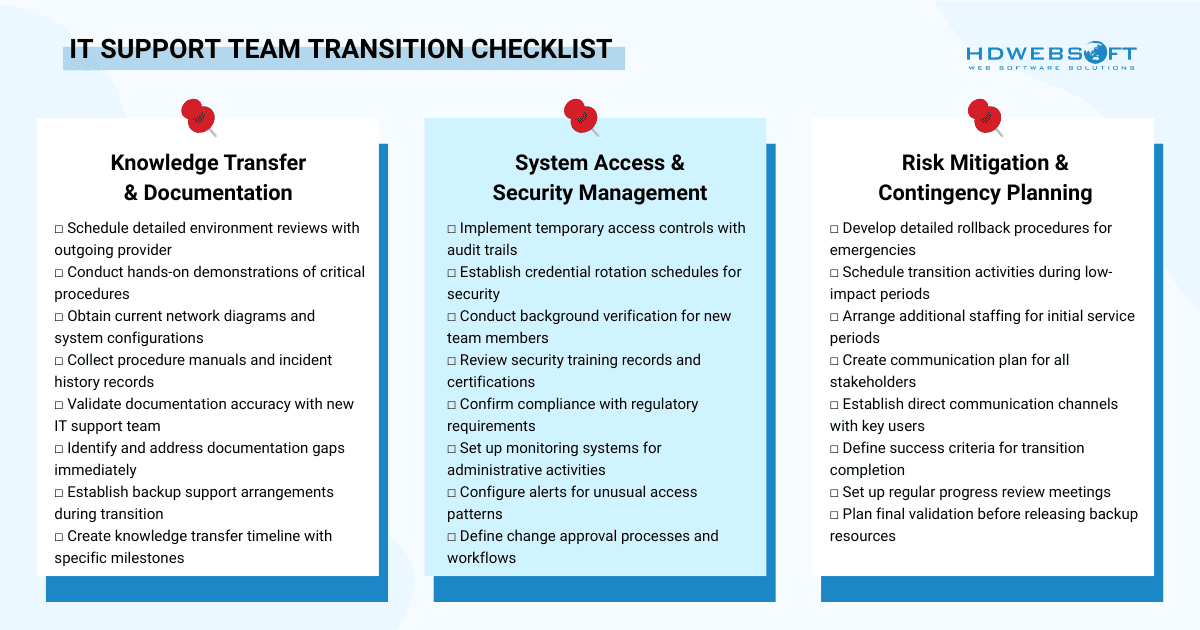
Ongoing Relationship Management
Effective partnerships with IT support service providers require continuous attention and formal management processes that ensure service quality and alignment with evolving business needs. Here’s a framework to maintain effective partnerships and ensure continuous service improvement:
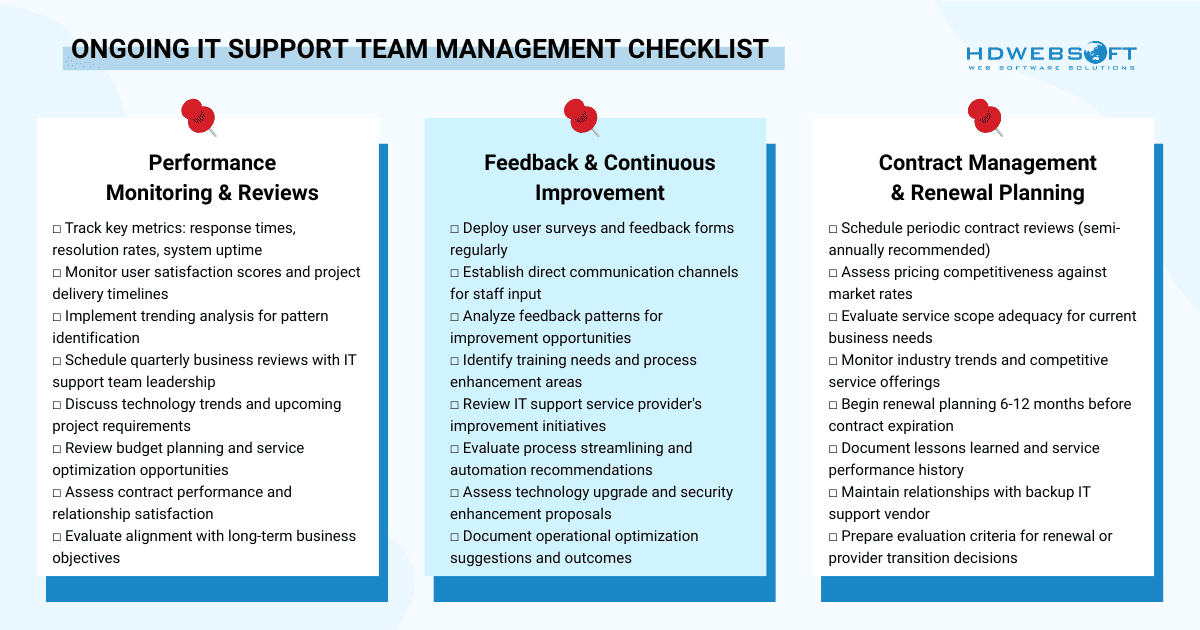
Conclusion
Selecting the right IT support team requires a systematic evaluation of technical capabilities, service delivery frameworks, security practices, and cultural alignment factors. While the process demands significant time investment upfront, choosing wisely creates long-term partnerships that drive business success. In the end, the right partnership transforms IT from a cost center into a strategic business enabler that supports growth and innovation.
Ready to partner with a proven IT support vendor that combines technical excellence with strategic business focus? HDWEBSOFT offers comprehensive IT outsourcing solutions designed to optimize your technology operations while reducing costs and complexity.







